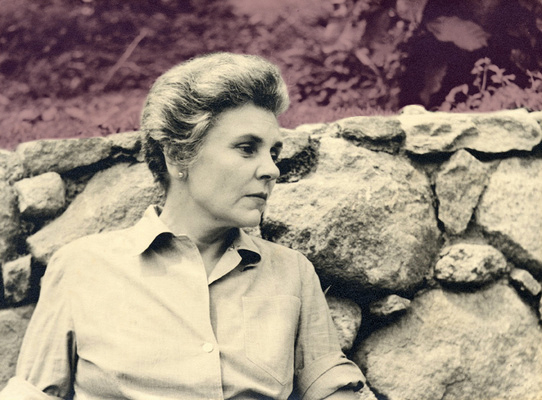
In 1947 Randall Jarrell introduced Elizabeth Bishop to Robert Lowell. Lowell described that first meeting: “[we were] swimming in our young age, with the water coming down on us, and we were gulping.” Below, Bishop writes to Lowell of her upcoming visit to New York. Lowell was to read with Louise Bogan, Marianne Moore, and Allen Tate at the New School. Lowell was six years younger than Bishop, but as the more established poet was instrumental in aiding Bishop’s success. He helped her secure his former post as Poetry Consultant for the Library of Congress in 1949, and directed her applications for grant funding when she lived in South America later in life.
[May 22, 1948]
New telephone # WA4-3487
Saturday—
Dear Cal:
To my great surprise, Marianne has accepted the invitation to have dinner before your readings. When I talked to her the other day she said that she believed on such occasions one should stay severely alone for several hours ahead of time, in order to “freeze the force” properly. Of course I irreverently suggested a shot of Novocain, but anyway, she likes Mr. Tate very much, and she began by refusing & then by imperceptible stages worked herself around into an enthusiastic acceptance. I think it will be very nice.
She suggested some place near the New School—to go on right afterwards—it seems to me that Rochimbaud place on 6th Avenue, about 11th Street, would be good—but if you have any better ideas why just let me know. I said I’d call her Tuesday morning & make the final plans. She is much concerned about whether the auditorium will be heated or not & I have just had a very funny conversation with two Scandinavians I think, “engineers,” whose final statement was: “If gets real cold, we gives heat.” But they “spelled” each other with me on the phone, each hardly waiting to be next to speak to this lunatic. Will you ask Mr. Tate? (Mrs. [Caroline Gordon] —too).
I like Middlemarch very much but read it long ago. Last winter I read the first book, Clerical Sketches & parts of it are marvelous—the V. woolf [sic] piece on G. Eliot isn’t so bad.
I saw the Rahvs who asked after you.
I’m looking forward to Tuesday.
Yours,
Elizabeth
Notes: Bishop refers to George Eliot, Scenes of Clerical Life (1857), and Virginia Woolf’s piece, “George Eliot,” in The Common Reader (1925). The Rahvs are Natalie Swan and Philip Rahv.
From Words in Air: The Complete Correspondence of Elizabeth Bishop and Robert Lowell. Edited by Thomas Travisano. New York: Farrar, Strauss & Giroux, 2008.
FURTHER READING
Read Virginia Woolf’s review of George Eliot (mentioned above), originally published in The Common Reader.
Read selections from North and South, Bishop’s first collection of poems. Bishop began her correspondence with Lowell after reading his opinion of it in The Sewanee Review.
Watch a video on Elizabeth Bishop’s epitaph and her poem, The Bight. Inspired by a letter she wrote to Lowell, Bishop wrote The Bight on her 37th birthday.


